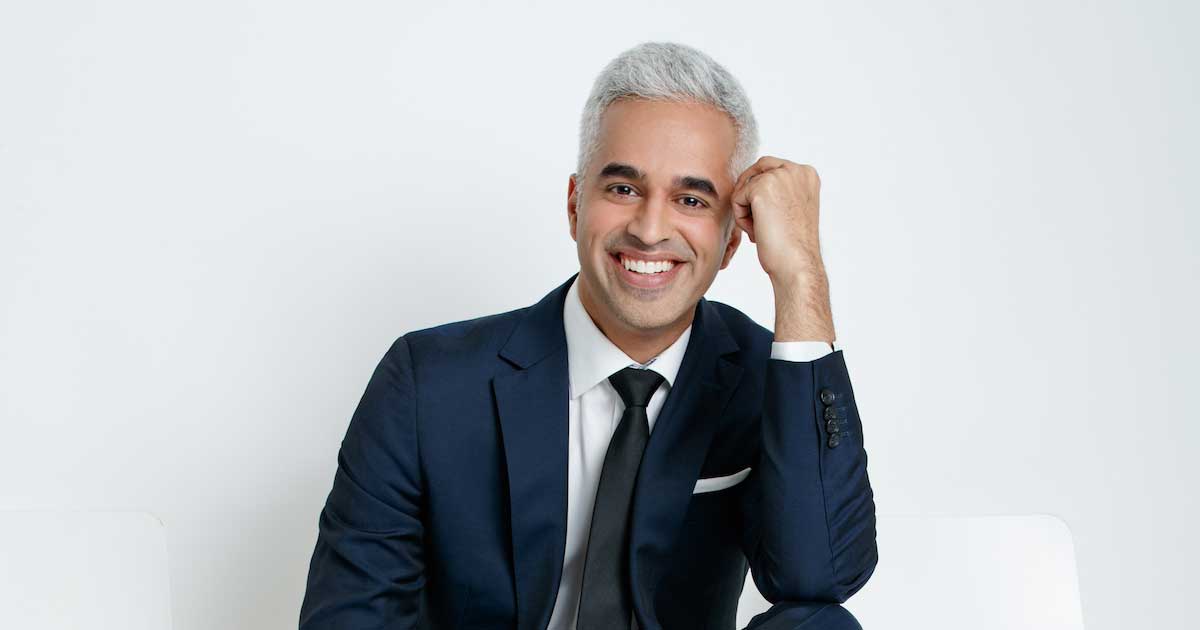Can practicing the art of effective conversation change your life and the lives of others around you? Riaz Meghji, successful TV personality, author, business coach and keynote speaker, aims to show meeting professionals during his presentation at MPI’s World Education Congress (WEC), June 21-23, just how much it can.
“It will feature storytelling on breakthrough conversations that strengthen relationships,” says Meghji, who lives in Vancouver with his wife and son. “How can you lead with empathy in order to truly connect? There are many ways to communicate, but very few ways to really connect. You can’t connect or support anyone if you can’t understand the importance of what I call empathetic curiosity.”
Meghji believes that the pandemic has made the need for effective, empathetic communication more crucial than ever. As meetings and events come back to life, he says that event attendees are hungry for purposeful and personalized experiences as never before. At the same time, meeting professionals are transitioning to work in virtual and hybrid environments that pose new challenges for audience engagement.
WEC: Your gateway to the new era of events. Learn more about Riaz Meghji and the rest of the exciting WEC speaker lineup.
Meghji notes that communication in virtual and hybrid formats can be ambiguous and easily lead to misunderstanding. As an example, he cites how easily it is to misinterpret a message sent in an email or posted on social media.
“In communication forms such as email, we tend to assume the worst,” he says. “Does this client like me? In the virtual world, it’s easy to engage in social self-sabotage. We need to know how we can clarify our intent, how we can create a more inclusive two-way conversation.”
How has the pandemic changed the nature of conversations? Meghji observes that casual conversations between strangers are not as likely to be as superficial as they were before.
“Knowing that we’ve had this universal experience, people are more willing to open up because they know they aren’t alone,” he says. “This creates new opportunities for leaders now to build trust, to replace criticism with curiosity. You can have conversations that show people you have their back.”
A deeper level
Meghji says his WEC presentation will illustrate how to have these conversations, including how to listen more effectively and use questions to take conversations to a deeper level.
“Many of us after the pandemic are wondering what is safe to talk about,” he says. “How do we not offend people? It’s about asking for stories and not just answers. In 20 years of interviewing, I’ve found that it’s stories that ignite emotion and create bonds. You get stories by asking things like, ‘When is the last time you did something for the first time? How did you face that uncertainty? What are your triumphs and success stories?’ You want people to share their successes and lessons.”
In his own life, a powerful conversation changed his entire career trajectory. In 2001, Meghji was in his final college semester at Simon Fraser University studying finance in preparation to be an investment broker, something his upwardly mobile immigrant family expected him to do. It was then that a mentor encouraged him to radically change his plans and go into the entertainment field instead.
“You can’t connect or support anyone if you can’t understand the importance of what I call empathetic curiosity.”
“He told me that I was going to waste my talent, that I shouldn’t just play it safe and should start living my life,” Meghji says. “He encouraged me to take a year and see what I can do. Before too long, I landed an internship at MTV Canada. I always thanked him for seeing my potential before I saw it.”
Since then, a 17-year broadcast career has included serving as a host for CityTv’s Breakfast Television, TEDx Vancouver, CTV News and the Toronto International Film Festival, conducting in-depth interviews with such luminaries as Jennifer Lopez, Tom Cruise and Salmon Rushdie. Along the way, he also authored the book “Every Conversation Counts: The 5 Habits that of Human Connection that Build Extraordinary Relationships” and launched the Every Conversation Counts platform, which includes workshops and coaching on effective communication for business and leadership.
Richelle Akimov, director of sales for Gordon Food Service, is among those who say they have benefitted from working with Meghji.
“Riaz helped me find and elevate my virtual voice,” she says. “He taught me how to weave storytelling through a presentation to impact your audience.”
Creating relationships
While Meghji’s career in broadcasting has long drawn on his ability to engage audiences through interviewing and storytelling, he acknowledges that his experience as a presenter at conferences is what has really put his skills to the test. This became evident when he planned a presentation for a recent hybrid event in Vancouver.
“I was told the virtual audience would not be joining in until the week after the live event,” he says. “I was incredulous. You want me to engage with an audience that’s not here live?”
To overcome that hurdle, Meghji and his team reached out to the virtual audience in advance of the conference, recording their responses to questions and then presenting the most thoughtful examples during the keynote at the live conference.
“It was a way for the virtual audience to be seen and acknowledged,” Meghji says. “At the same time, the live audience was able to have a seamless experience with those on camera. We were able to create an experience that felt like real-time.”
“Yes, the content of a meeting is important, but it’s the opportunity to connect with others that is really powerful.”
During his presentation at WEC, Meghji plans to share with the audience the insights his ever-evolving career has taught him. He believes that among the most common traits of successful leaders, two stand out: the discipline to outwork the person next to you and the ability to maintain the fresh mindset of a beginner.
What does Meghji most hope that meeting professionals will take away from his presentation?
“Overall, my goal is to give people ideas and move them with emotion and out of autopilot mode,” he says. “How they can be intentional in creating relationships? If you’re creating an experience, it’s based on relationships. Yes, the content of a meeting is important, but it’s the opportunity to connect with others that is really powerful.”
Sponsored by:

In partnership with:








